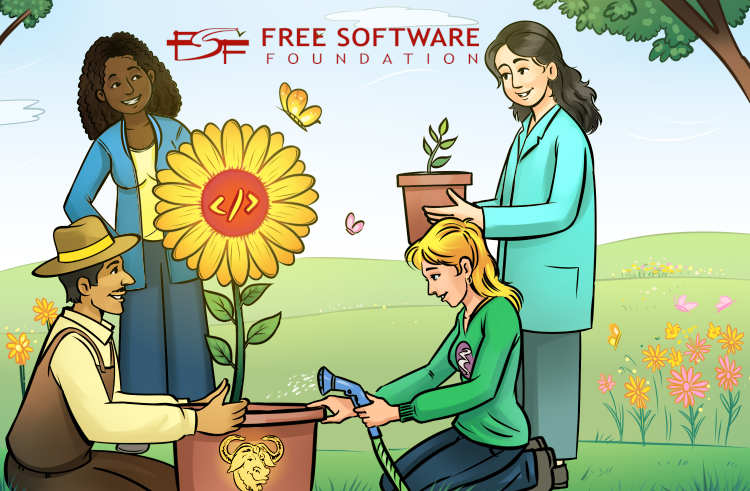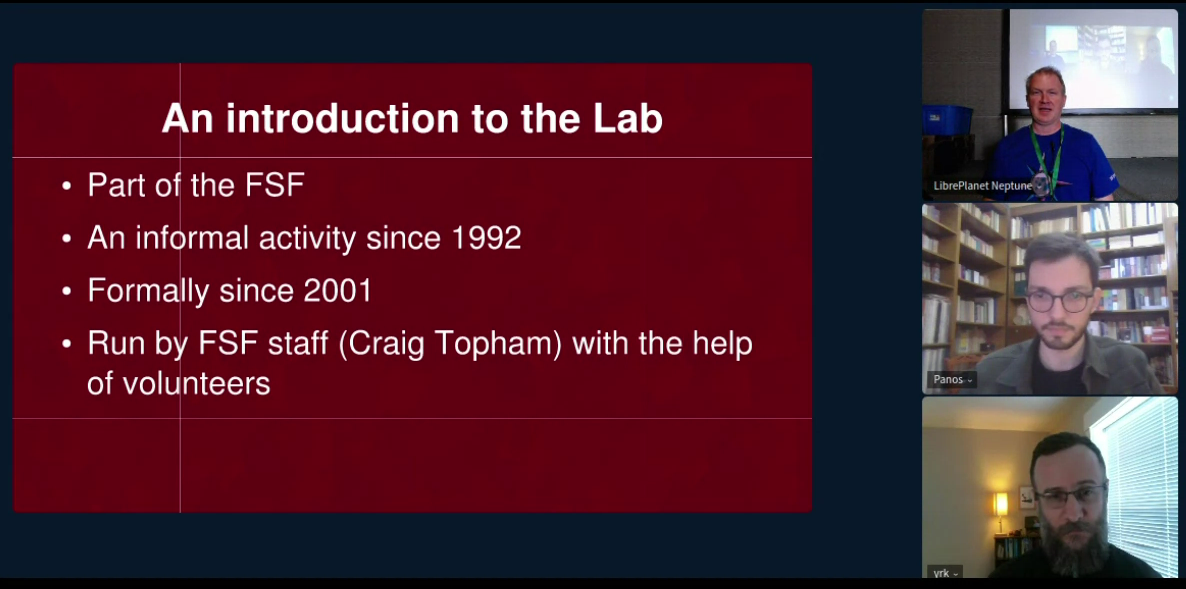Working together for free software licensing

At the Licensing and Compliance Lab, we are actively answering licensing questions sent to us through the licensing@fsf.org email address. Over the last year, we’ve answered approximately more than 300 questions from free software developers and others wishing to get clarity on free software licensing. Although we have resources that cover the family of GNU General Public License (GPL) and other free software licenses such as the GPL FAQ and the FSF’s license list, developers of free software and folks curious about licensing always find new and thought-provoking questions to ask. However, helping the community by answering licensing questions isn’t a one directional service being offered. Your questions help sharpen the minds of us working in the Lab, so that together we can grow to tackle the tougher questions.
Your licensing questions are fielded by the licensing volunteers and myself. During LibrePlanet this year, the volunteers and I also had the opportunity to share how we each came to free software and how volunteering for the Lab is not only fun, but constantly expands our understanding of free software licensing.

If you are new to free software licensing, a great way to enter this space is by attending our weekly Free Software Directory (FSD) meetings where we evaluate programs to see if they are free software or not. Several times a month, I find myself walking someone through the evaluation process. It is easier than you think, especially when a program follows our guidelines of how to use GNU licenses for your own software. Even if a program doesn’t use a GNU license, by following our recommendations, every recipient can easily find out what license the code is under. If you know a project which isn’t in the FSD, you can add it, and either myself or another administrator will review it when we can. Alternatively, you can come to a FSD meeting and we can work together to see if the program is free software. FSD meetings are held every Friday from 12:00 to 15:00 EDT in the #fsf channel of the Libera.Chat IRC network.
Once you have access to free software, you’ll want to run it on hardware which respects your freedom. When you use a proprietary system, you don’t control that device, the manufacturer does. This is unjust and unethical. To help others find hardware which exclusively runs free software, the Lab also facilitates the Respects Your Freedom (RYF) certification program. RYF is designed to certify devices and how they are presented to the customer to make sure your freedoms are not being curtailed. Since the last fundraiser, the Lab was able to certify the Think Penguin’s Free Software Gigabit Mini VPN Router (TPE-R1400) which runs on LibreCMC, an FSF-endorsed distribution. I will be working hard to certify more devices in the future.
In order to get the word out about projects which use a GNU license, the Lab has been publishing new GPL interviews, featuring free software developers who choose GNU licenses for their works. In September, we published an interview with Martin Dougiamas of Moodle, a free software learning platform licensed under the GNU General Public License version 3. In May, we interviewed Frans de Jonge who talked about KOReader, a free software e-reader program licensed under the GNU Affero General Public License version 3. We help to keep the public informed of interesting free software projects out there, and you can expect more GPL interviews in the future. If you know of a cool project you’d like to see highlighted for an upcoming interview, send your ideas to licensing@fsf.org.
The associate member program started in November of 2002 to support the core work of the free software movement, independent from major individual or corporate donors. The FSF wanted to be sustained by the community we serve. As of today, membership dues make up most of the FSF’s operational costs. Without members we would not be able to carry out the important work the FSF does for the free software movement. The membership program keeps us working, and the Licensing and Compliance Lab has been working for you nonstop. Together with your help, we can strive towards a world where computer user freedom is universal. Can you join this effort as an FSF associate member? You can start for as little as $10 per month ($5 for students), or $120 per year. With your support we can get to the strength in numbers we need to both continue our work and take on the challenging developments where we need to take a stance. Plus, your membership will count towards achieving our spring goal of 175 new associate members before July 21. You’ll be able to enjoy all the member benefits, which include merchandise discounts, a 16GB bootable membership card, and use of our associate member videoconferencing server. When you join as an annual associate member at $120 or more, you’ll also be eligible for this year’s sustainable and stylish, genuine wood GNU head sticker.
Image Copyright © 2023 Free Software Foundation, Inc., licensed under the Creative Commons Attribution-ShareAlike 4.0 International license.

